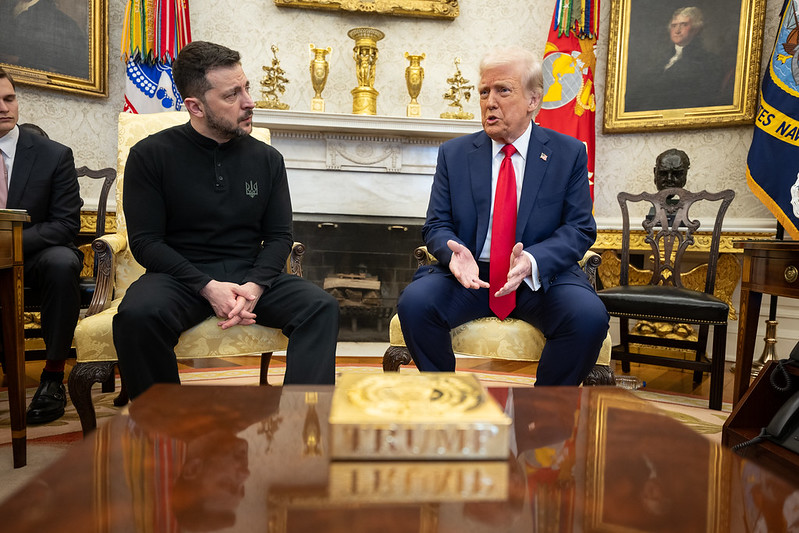History sometimes has an affinity for irony. Two historic conversations between presidents Donald Trump and Volodymyr Zelensky — one polite, one contentious — perfectly illustrate this.
The first, a 2019 phone call, was cordial, transactional, rather bland in fact, and yet had a negative result, leading to only the third presidential impeachment in American history. The second, a 2025 Oval Office meeting, was tense and confrontational and appears to have a potentially world-altering positive result of ending a three-year war while producing a mutually beneficial mineral deal.
As explained in my book, “Abuse of Power,” the 2019 Trump-Zelensky phone call was the moment Democrats had been waiting for — an opportunity, no matter how tenuous, to justify what they had already determined: Trump had to be impeached.
Robert Mueller’s Russia investigation had deflated into an embarrassing dud. The Steele dossier was exposed as partisan fiction. Yet, impeachment was still a craving for hardline House Democrats that then-Speaker Nancy Pelosi caved to.
The pretext was that Trump had “pressured” Zelensky’s government to look into the Biden family.
However, one must read the transcript of the call, and the reality becomes evident that Zelensky first mentioned Rudy Giuliani. It was in determining whether Joe Biden strong-armed the country to quash a probe into scandal-plagued energy firm Burisma, where Hunter Biden was a board member.
Trump kicked off the 2019 chat by telling the newly elected leader: “You did a terrific job, the way you came from behind, somebody who wasn’t given much of a chance, and you ended up winning easily.” Zelensky followed, claiming his campaign learned from Trump’s. The two leaders agreed European allies weren’t carrying their load, and Zelensky even expressed his desire to “drain the swamp here in our country.”
He later said, “I will personally tell you that one of my assistants spoke with Mr. Giuliani just recently and we are hoping very much that Mr. Giuliani will be able to travel to Ukraine and we will meet once he comes to Ukraine.”
Yet, the major media mainly joined then-Rep. Adam Schiff’s crusade to frame the call as a shakedown. Trump was impeached over this in the House for two vague non-crimes. The Senate inevitably acquitted him.
Fast-forward almost five years. Trump and Zelensky — two prominent TV personalities before they were presidents — faced each other again, this time in the Oval Office. This was not the bland 2019 call. It became a TV performance for the ages and potentially a diplomatic disaster. Much like the coverage of the 2019 call, the media cast Trump as a bully. Yet, viewing the 40-minute meeting shows that Zelensky first became testy.
Regardless, it appears we are headed toward a ceasefire between Russia and Ukraine and a U.S.-Ukraine mineral deal.
Ukraine and the United States agreed to ceasefire terms, with Secretary of State Marco Rubio asserting the “ball is in Russia’s court.”
As explained in “Abuse of Power,” the U.S.-Ukraine-Russia relationship was complicated long before Trump was in the White House.
In a perfect world, the 1994 Budapest Memorandum would have prevented the current war. In an ideal world, Ukraine could trounce Russia rather than likely give up some territory to its invaders. However, a ceasefire is likely the only path forward in the world as it is. Ukraine cannot win a war of attrition, and Putin has no concern for how many Russian soldiers die. The U.S. cannot bankroll this war indefinitely.
Putin is about as trustworthy in honoring a ceasefire as Hamas. That’s why a U.S.-Ukraine mineral agreement is essential. It’s not only mutually economically beneficial for both countries but also security-wise. Putin is unlikely to attack a country where the U.S. has a significant financial stake. The economy, not the military, stands as a deterrent.
A deal with Ukraine — which has multiple rare materials that can power weapons, electric vehicle batteries, and other electronics — could make the U.S. and its allies far less reliant on China for these materials.
Trump, notably, is the only recent U.S. president during whose term Putin refrained from invading another country. Unlike President Barack Obama, who sent Ukraine blankets in response to the Crimea invasion, Trump sent lethal aid. With President Joe Biden’s projection of weakness, Putin saw an opportunity for a full-scale invasion of Ukraine.
History loves symmetry, and perhaps it will grant us one more irony: that the very man impeached for a cordial, albeit not a “perfect,” phone call with Zelensky might also be the man who brings a real peace deal to Ukraine.


